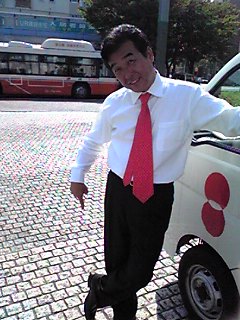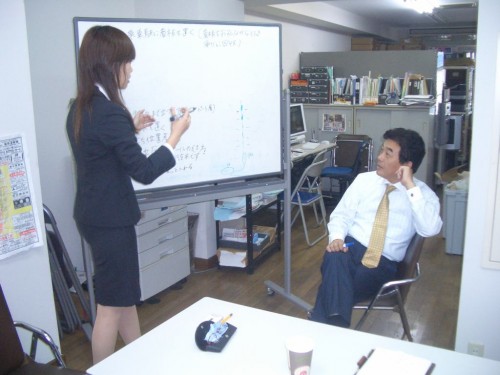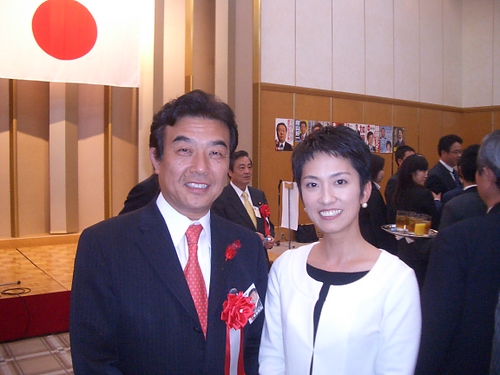Katsuhiro Suzuki (51) – This first-time candidate has DPJ backing and is running on his status as a born-and-raised Adachi-ku resident and his achievements as a businessman. He has spent most of his career in the job training industry and is currently active as a member of the local DPJ’s policy committee.
After starting at Recruit and then “a consultant company,” in 1996 he became involved in the establishment of Nagase PC School, an IT-related job training operation that, in his words, specialized in turning part-timers and “NEETs” (people Not in Employment, Education, or Training) into full-time employees. After that experience he moved on to other job training businesses before entering politics. Former colleagues from Recruit and his job training businesses are advisors and managers of his political campaigns.
Policy: His policies nominally focus on furthering the mission of his private-sector experience (getting underutilized young people into the workforce) in the political field. But other than that external flavoring, he seems to propose throwing money at Tokyo’s problems just like everyone else.
Generally, he is very proud of his achievements in the private sector and believes those lessons apply to government. Though not part of his official campaign literature, his Livedoor blog features commentary on issues of the day and provides clues to his way of thinking.
One of his most passionate blog posts comes from March 2009, in which he outlines why former executives like him belong in politics. He thinks politicians need “private sector skills” (民間力) defined as: creativity 創造力, the ability to be a producer プロデュース力 (meaning to put together and follow through on projects), the ability to know what’s happening on the ground 現場力, competitive strength 競争力, the ability to manage people マネジメント力, the ability to manage a business 経営力, and the ability to evaluate results 評価力.
Chances of winning: As a new and untested candidate he might have a tough time against several incumbents. From 2001 to 2005, the DPJ has picked up a seat from the LDP, moving the party standings in Adachi-ku from
- LDP – 3
- Komeito – 2
- Communist – 1
- DPJ – 0
To:
- LDP – 2
- Komeito – 2
- Communist – 1
- DPJ – 1
With the polls behind the DPJ, Suzuki might have a chance to edge out another LDP candidate (I expect the Communists and Komeito have the votes to keep their people in power). However, the election in Adachi-ku is more competitive than usual, contrary to the prefecture-wide trend. There were 7 candidates in 2001, 8 in 2005, and this year there are 10. On top of that all the incumbents except are running again, save for the Communists. If the vote splits among new candidates Suzuki might be in trouble.
A touch of humanity: He once headed his local PTA and claims to have had a dual-income household with his wife for the past 20 years, but that is all he is apparently willing to tell us about his personal life.
I went through this guy’s entire blog to try and find something truly interesting, and the closest I could come up with was that rant about how awesome corporate executives are. But I have a theory for why this is so: he spends all day every day speechifying in front of Ayase station. As his blog will back up, he seems to always be either in Kitasenju or Ayase station speaking into a microphone about how badly he wants to represent Adachi-ku. For months now I have seen him outside Ayase Station.
One reason I have trouble supporting this guy is he apparently forces his interns to wear uncomfortable-looking business suits:
And for good measure here’s one of Suzuki and Ren Ho (taken at a Rengo-affiliated local union meeting):





Adamu, I like this series, because I don’t think the voters really get a chance to breakdown the candidates past a name, party, and former profession.
That being said, let’s ignore for a moment *who* these people are. What is the significance of the seat that these candidates like Mihara, Onishi and Mihara are vying for? I don’t know the first thing about Adachi-ku, so it’s a bit clear whether an Adachi-ku resident is going to profit/lose by choosing Suzuki because he is DPJ (i.e. he casts one more vote for a greater agenda) or they are going to profit/lose by choosing him because he has certain ideas that direct affect things going on in Adachi-ku, (i.e. he can liaise with the Tokyo assembly to get things done for a very local agenda). Perhaps the implication is that they can profit/lose on both levels by choosing him.
My wife doesn’t give a hoot about elections like this, and she unlike you or I, has the right to cast a vote. I, unfortunately, cannot think of an argument to overturn her opinion.
So let me ask–and apologies for all unintended snarkiness–why is it that you and Mrs. Adamu care?
That is a good question. I outlined some of these issues in my earlier post on the election, but here’s a rundown:
These elections actually don’t matter all that much. An opposition coalition in power could conceivably block the budget to keep Ishihara from pushing insane policies like the Shin Ginko Tokyo, but the governor’s veto power, dissolution power, and other powers keeps them from making much policy themselves.
However, even this hope for “regime change” is somewhat unrealistic. The current makeup of the assembly:
LDP – 48
DPJ – 34
Komeito – 22
Communists – 13
Others – 7
Even if the DPJ takes seats from the LDP, they still have to try and work with the other parties to get anything done. And considering that only 220 people are running for 127 (and almost all the incumbents are running for re-election), there seems to be little hope for a major shakeup in the government.
So for the average voter there is not too much difference. But thanks to the media’s interpretation of the election as a referendum on the LDP-Komeito government, voters can also use the opportunity to register their support/opposition to national policy.
But for the members themselves, a seat at the assembly can be very juicy. You make 17 million yen a year plus perks, and you can negotiate favors quite easily.
The candidates are ALL campaigning on programs of expanded welfare benefits, so in that sense they are promising to leverage the prefectural assembly to gain benefits for Adachi-ku residents. The JCP (and to a lesser extent the DPJ) are also promising to fight Ishihara’s agenda.
I am interested just to know what’s behind all the campaigning. Also I think Ishihara needs a check on his power, so it would be nice to have the DPJ at least become the top party in power even if there is little hope they will wield much control since the second largest party would be the Komeito.
Previous post: https://www.mutantfrog.com/2009/06/26/tokyo-prefectural-elections-july-12/
Ishihara’s powers: http://ja.wikipedia.org/wiki/%E9%83%BD%E9%81%93%E5%BA%9C%E7%9C%8C%E7%9F%A5%E4%BA%8B#.E6.A8.A9.E9.99.90.E3.81.AE.E5.BC.B7.E3.81.95
Assembly makeup: http://www.gikai.metro.tokyo.jp/membership/political_party.html
It would be a fine thing indeed for Blinky to suffer the rebuke of an LDP-Komeito loss, especially after the ShinGinko larceny. Here’s hoping Tokyo voters aren’t utterly insane enough to return the ruling coalition to power. (Though 52% of them are apparently insane enough to still support Blinky; he’s a crafty old Karl Luger-style fascist, that Blinky.)
could I learn more about Katsuhiro Suzuki. His family brothers and sisters. I may be related to him. My grandmother Fuji Suzuki lived in Adachi Ku. My mother Katsue (sue) Suzuki had a Brother Michio who had a son named Katsuhiro and Masahiro and a daughter Kyomi. Mothers name was Kenu. Thanks.
Donna Langit
Anchorage Alaska USA